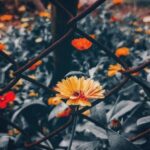Are you looking to create a serene and enchanting outdoor space in your garden? The butterfly garden layout design corner with bench and stepping stones might just be the perfect addition for you.
Butterfly gardens are an excellent way to attract these beautiful creatures to your yard while also creating a relaxing environment for yourself. In this article, we will explore the key elements of designing a butterfly garden, choosing the right corner, incorporating a bench and stepping stones, selecting the perfect plants, and maintaining this serene oasis.
A butterfly garden is more than just a collection of pretty flowers; it is a carefully designed haven for these delicate insects. Choosing the perfect corner for your butterfly garden is crucial in providing them with the ideal environment and ensuring their safety. We will discuss how to select a suitable spot in your yard that receives adequate sunlight and shelter from strong winds, as well as tips for creating an inviting space that appeals to both butterflies and humans.
Incorporating a bench into your butterfly garden layout not only adds functionality but also enhances its charm. A strategically placed bench allows you to relax and enjoy the beauty of nature while attracting butterflies with its colors and scents.
Furthermore, stepping stones play an essential role in guiding visitors through the garden without disturbing the delicate ecosystem. Let’s dive into how these elements can transform your outdoor space into a tranquil retreat that welcomes butterflies and provides you with a peaceful escape from the hustle and bustle of everyday life.
Choosing the Perfect Corner for Your Butterfly Garden
When it comes to creating a butterfly garden, choosing the perfect corner for your garden is crucial. The right location can make a significant impact on the success of your butterfly garden. Here are some factors to consider when selecting the ideal corner for your butterfly garden:
- Sunlight: Butterflies are attracted to sunlight, so it’s important to choose a corner of your yard that receives ample sunlight throughout the day.
- Shelter: While butterflies love sunlight, they also need shelter from strong winds and predators. Consider positioning your garden in a corner that provides some protection from harsh elements.
- Accessibility: Choose a corner that is easily accessible for you to tend to your garden. You’ll want to be able to easily maintain and care for your plants without any hindrances.
Incorporating these considerations into your decision-making process will help you choose the perfect corner for your butterfly garden. Once you have identified the ideal location, you can begin planning the layout and design of your beautiful butterfly garden.
Remember that creating a welcoming space for butterflies involves more than just planting flowers – it also includes providing suitable resting spots, such as benches and stepping stones, which we will discuss in detail in later sections. With careful planning and consideration, you can transform any corner of your yard into a thriving butterfly habitat.
Incorporating a Bench Into Your Butterfly Garden Layout
When designing your butterfly garden layout, it’s important to not only consider the plants and flowers you want to include but also the overall functionality and aesthetic of the space. One excellent addition to consider is a bench, which can serve as a resting spot for you to enjoy the beauty of your garden and observe the butterflies that visit.
When choosing a location for your bench, look for a spot that gets a good balance of sunlight and shade, as butterflies are attracted to both. You’ll also want to ensure that your bench is placed in an area with good visibility of the garden so that you can fully appreciate all its natural wonders.
Incorporating a bench into your butterfly garden layout can also provide an opportunity to create a focal point in the space. Consider placing the bench in a key area where it can be surrounded by colorful flowers or positioned near a particularly attractive plant. This will not only enhance the visual appeal of your garden but also provide an inviting and peaceful space for both you and any visitors to relax and enjoy.
Additionally, when selecting a bench for your butterfly garden, opt for materials that complement the natural surroundings. Wooden benches can blend seamlessly with the organic feel of a garden, while wrought iron benches can add an elegant touch.
Whichever style you choose, ensure that it is weather-resistant and durable enough to withstand outdoor conditions. By incorporating a well-placed and beautifully crafted bench into your butterfly garden layout, you can create a tranquil sanctuary where you can unwind and delight in the vibrant displays of nature around you.
The Role of Stepping Stones in a Butterfly Garden Design
Stepping stones are not only functional but also add an aesthetic appeal to your butterfly garden. These stones can help create a pathway for you and visitors to navigate through the garden while minimizing foot traffic on delicate plants and flowers. When strategically placed, stepping stones can also provide resting spots for butterflies, allowing them to bask in the sun and take a break.
When designing your butterfly garden layout, consider incorporating stepping stones that blend seamlessly with the overall theme and design. Natural stone or pavers are popular choices for stepping stones as they complement the natural beauty of the garden. The placement of the stepping stones should encourage a sense of discovery and exploration, creating an engaging experience for both human visitors and butterflies alike.
In addition to their practical uses, stepping stones can also serve as focal points in your butterfly garden. You can use them to highlight specific areas or plants, drawing attention to the diverse flora that attracts butterflies. By carefully selecting and arranging the stepping stones, you can enhance the visual interest of your butterfly garden while providing essential pathways for both humans and butterflies.
| Benefit | Example |
|---|---|
| Functionality | Creating pathways within garden |
| Aesthetic Appeal | Adding visual interest to the garden |
| Focal Points | Highlighting specific areas or plants |
Selecting the Right Plants for Your Butterfly Garden
When creating a butterfly garden, selecting the right plants is crucial in attracting and nurturing these beautiful creatures. Butterflies are attracted to nectar-producing flowers, so it’s important to choose a variety of plants that will provide a continuous source of nectar throughout the year. Additionally, including host plants where butterflies can lay their eggs and their caterpillars can feed is essential for the long-term success of your butterfly garden.
Nectar-Producing Flowers
When choosing nectar-producing flowers for your butterfly garden, consider native plant species that are adapted to your specific region. These plants will not only attract butterflies but also be well-suited to the local climate and soil conditions. Some popular options include milkweed, coneflowers, lavender, butterfly bush, lantana, and verbena. By selecting a variety of flower shapes, sizes, and colors, you can attract a diverse range of butterfly species to your garden.
Host Plants
Incorporating host plants into your butterfly garden is essential for providing food for caterpillars. Different species of butterflies have specific host plants where they lay their eggs, and their caterpillars feed on the leaves once hatched. For example, monarch butterflies rely on milkweed as their host plant. Other examples include parsley for swallowtail butterflies and passionflower vine for gulf fritillary butterflies.
Butterfly-Friendly Herbs
In addition to nectar-producing flowers and host plants, consider including butterfly-friendly herbs in your garden such as dill, fennel, and parsley. These herbs not only provide nectar for adult butterflies but also serve as host plants for certain butterfly species.
By carefully selecting the right combination of nectar-producing flowers, host plants, and herbs, you can create an inviting habitat that attracts a wide variety of butterflies to your garden while also providing them with the resources they need to thrive throughout their life cycle.
Attracting Butterflies to Your Garden With the Layout Design
Butterflies are not only beautiful creatures to behold, but they also play a crucial role in pollinating flowers and plants. Therefore, attracting butterflies to your garden can bring life and color to your outdoor space. One effective way to attract butterflies is through thoughtful garden layout design. By choosing the right plants and incorporating key features such as a bench and stepping stones, you can create a welcoming environment for these delicate insects.
In order to attract butterflies to your garden, it’s important to include a variety of nectar-rich flowers that appeal to different butterfly species. Additionally, providing host plants for caterpillars to feed on is essential for creating a sustainable butterfly habitat. When planning the layout of your garden, consider clustering these plants together in specific areas to create “butterfly hotspots” that will draw in these winged visitors.
Beyond plant selection, the overall design of your butterfly garden can also influence its attractiveness to butterflies. Adding a bench allows you to sit back and observe the fluttering activity while providing a resting spot for weary travelers. Stepping stones not only add an aesthetic appeal but also give butterflies access to water or mud puddles where they can collect essential minerals.
By strategically designing your butterfly garden with the needs of butterflies in mind, you can transform your outdoor space into a haven for these enchanting insects. Whether small or expansive, a well-designed butterfly garden encourages biodiversity and enhances the natural beauty of your surroundings while providing a peaceful place for relaxation and observation.
Maintaining and Caring for Your Butterfly Garden
Once you have designed and implemented your butterfly garden layout corner with a bench and stepping stones, it’s important to maintain and care for this beautiful space to ensure its longevity and the attraction of butterflies. Here are some essential tips for maintaining and caring for your butterfly garden:
- Regular watering: Ensure that your butterfly garden receives adequate water, especially during dry spells or hot weather. Watering in the morning is ideal as it allows the moisture to penetrate the soil before the heat of the day.
- Weeding: Regularly remove weeds from your butterfly garden to prevent them from competing with your chosen plants for nutrients and sunlight. This will also help maintain the aesthetic appeal of your garden.
- Pruning: Prune your plants as needed to encourage healthy growth and prevent overcrowding. This will also help maintain a neat and tidy appearance in your butterfly garden.
In addition to these general maintenance tasks, it’s important to care for specific plant species that are known to attract butterflies. Different plants may require different care, so be sure to research the specific needs of the plants in your butterfly garden. By staying on top of maintenance tasks and caring for your plants, you can create an inviting environment for butterflies while ensuring that your butterfly garden remains vibrant and beautiful.
Creating a Relaxing and Tranquil Space With a Butterfly Garden Corner With Bench and Stepping Stones
Adding a Bench for Relaxation
One key element of creating a relaxing and tranquil space in your butterfly garden is to incorporate a bench into the design. The bench provides a place for you to sit and admire the beauty of the garden while also serving as a spot for meditation or simply enjoying the peaceful surroundings.
When choosing a bench for your butterfly garden, opt for one made of natural materials such as wood or stone to blend seamlessly with the natural elements of the garden.
Utilizing Stepping Stones
In addition to the bench, stepping stones can be strategically placed throughout your butterfly garden to create a path that invites exploration. These stones not only add visual interest to the layout but also serve a practical purpose by allowing easy access to different areas of the garden. By incorporating stepping stones, you can encourage visitors to take their time and truly immerse themselves in the serenity of the space.
Creating an Inviting Atmosphere
By combining a bench, stepping stones, and lush vegetation, you can create an inviting atmosphere in your butterfly garden. The blend of natural elements invites peaceful contemplation and relaxation, making it an ideal spot for unwinding after a long day or simply taking in the beauty of nature. It’s important to carefully consider placement and spacing when adding these features to ensure that they complement the overall layout and enhance the tranquil ambiance of your butterfly garden.
Enhancing the Aesthetics of Your Butterfly Garden With Creative Design Ideas
Butterfly gardens are not only a haven for beautiful butterflies but also an opportunity to create a breathtaking and aesthetically pleasing outdoor space. To enhance the aesthetics of your butterfly garden, you can incorporate creative design ideas that will elevate the overall look and feel of the area.
One way to do this is by adding decorative elements such as colorful birdbaths, whimsical garden sculptures, or unique planters. These elements can add visual interest and personality to your garden while attracting more butterflies with their vibrant colors and designs.
In addition to decorative elements, you can also enhance the aesthetics of your butterfly garden by introducing unique features such as a soothing water feature or a decorative arbor. A small pond or fountain not only adds a tranquil ambiance to the space but also attracts butterflies, providing them with a source of water. An arbor can serve as a focal point in your garden, providing support for climbing plants and creating a sense of enchantment with its charming structure.
Furthermore, thoughtful lighting can also play a significant role in enhancing the aesthetics of your butterfly garden. Incorporating solar-powered LED lights along paths or around key features in the garden can extend its visual appeal into the evening hours.
Lighting not only adds an element of magic to the space but also illuminates the beauty of your butterfly-attracting plants and flowers. By incorporating these creative design ideas, you can transform your butterfly garden into a visually stunning oasis that delights both visitors and butterflies alike.
Conclusion
In conclusion, creating a butterfly garden layout design corner with a bench and stepping stones can be a fulfilling and rewarding project for any gardening enthusiast. By carefully choosing the right corner of your yard, incorporating a comfortable bench, and strategically placing stepping stones, you can achieve a beautiful and functional space that attracts butterflies and provides a tranquil retreat for relaxation.
By selecting the perfect plants for your butterfly garden, you can further enhance the beauty and appeal of your outdoor space while also providing essential nectar and host plants for butterflies. Additionally, by maintaining and caring for your garden, you can ensure that it remains a thriving habitat for these beautiful creatures.
Ultimately, by implementing creative design ideas that enhance the aesthetics of your butterfly garden corner with a bench and stepping stones, you can create a visually stunning and inviting space that will bring joy to both you and any visitors who may stop to admire your creation.
With careful planning and attention to detail, achieving the perfect butterfly garden layout design corner with bench and stepping stones is well within reach for anyone who is willing to put in the effort.
Frequently Asked Questions
How Do You Layout a Butterfly Garden?
To layout a butterfly garden, it’s important to consider the type of plants that will attract butterflies. Choose a sunny location with some shelter from the wind, and ensure there are both nectar-rich flowers and host plants for caterpillars.
Grouping plants together based on their height can create layers and provide resting spots for butterflies. Consider adding rocks or logs for basking and puddling areas for moisture.
What Are Three Things a Butterfly Garden Should Have?
A butterfly garden should have a variety of nectar-rich flowers to attract adult butterflies, native host plants for caterpillars to feed on, and a water source for drinking and puddling. Nectar-rich flowers might include coneflowers, milkweed, and butterfly bush, while host plants could be specific to certain species such as milkweed for monarch butterflies.
What Is a Good Size for a Butterfly Garden?
The size of a butterfly garden can vary depending on the available space and resources. Even a small garden plot or container garden can attract butterflies if properly planned with the right plants.
A larger garden will naturally attract more butterflies due to the increased diversity of plants and habitats it can offer. Ultimately, the size of the butterfly garden should fit within the available space while providing an attractive environment for these delicate creatures.

Welcome to my gardening blog! I am passionate about plants and enjoy sharing my knowledge and experiences with others. In this blog, I will write about everything related to gardening, from tips on how to get started to updates on my own garden projects.





